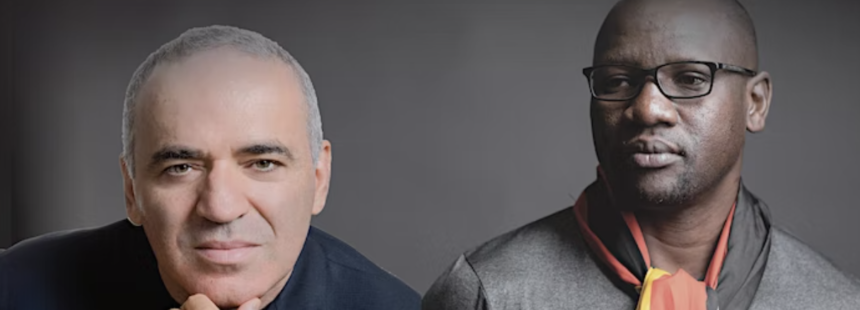

The Dickey Center hosted a panel discussion with democracy activists Garry Kasparov and Evan Mawarire. The speakers discussed the importance of active participation in pro-democracy efforts and the dangers of complacency. https://t.co/n6VIIu2viH
— The Dartmouth (@thedartmouth) October 25, 2022
This article is a reprint. You can read the original at The Dartmouth.
By Kent Friel
“On Thursday, Russian chess grandmaster Garry Kasparov and Zimbabwean pastor Evan Mawarire — both pro-democracy activists — appeared as guest speakers in “Voices of Dissent,” a forum presented by the Dickey Center for International Understanding. More than 300 attendees filled the Hanover Inn Grand Ballroom for the event, at which Kasparov and Mawarire spoke about their experiences as advocates for democracy and human rights.
Moderated by Dickey Center director Victoria Holt, the forum took a multimedia approach to link the stories of Kasparov and Mawarire, including showing documentary films that were created in a partnership between the Renew Democracy Initiative — a nonprofit founded by Kasparov — and Dartmouth.
Although the two have spoken together at events hosted by the RDI — where Mawarire serves as director of education — the event brought together their stories in a way that hadn’t been done before, executive director of RDI Uriel Epshtein said.
The forum opened with a documentary that introduced Kasparov, narrating his journey from chess champion to democracy activist. The eight-minute film combined news footage with interview segments, after which Kasparov took the podium onstage, speaking in depth about events shown in the film, including his arrests and his decision to leave Russia in 2013. Following his remarks, Kasparov introduced the next film, which told the story of Mawarire and his role in the 2016-2017 democratic protests in Zimbabwe. After Mawarire took the stage to share a few remarks, the event transitioned to a moderated discussion.
In responding to the audience’s questions, both speakers directed their messages toward college students, stressing the importance of active participation in democracy. Reflecting on his experience in working with regular people who stand up for democracy, Mawarire said that he is continually surprised at the “power that ordinary people do not know that they have.” Although small acts of dissent may not seem consequential, he argued that pro-democracy decisions take courage. Dissidents, Mawarire added, are essential in shaping the future, because “when one generation abdicates their duty, they burden the next generation.”
Although both Mawarire and Kasparov spoke about how American democracy serves a beacon for international dissidents, they also said they feared the results of polarization and abstention from democracy. Mawarire implored the audience to be responsible, adding that there has to be a “reality check as to the alternatives to democracy.” Kasparov stressed the importance of being vigilant and proactive in maintaining American democracy and also noted that the majority rule is not democratic without protection of minorities and a peaceful transfer of power.
When questioned about the future, both speakers remained optimistic that people from their respective home countries would continue to fight for democracy. Asked whether he believed Russia would become democratic, Kasparov said that Russia may arrive at “democracy by default.” Kasparov said that, when faced with “the choice [between] becoming a kind of Chinese colony that supplies natural resources to Beijing, or desperately trying to crawl back to become a member of the family of civilized nations,” Russia sees democracy as the better alternative. In order for that to happen, however, he said that democracies around the world would need to become stronger through domestic and international partnerships, arguing that a league of democracies would be more powerful than the United Nations in promoting human rights and democracy abroad.
Kasparov and Mawarire, however, saw a danger in waning faith in democracy worldwide. The fight for justice, Mawarire said, “cannot be outsourced.” Kasparov added that “nothing happens without taking a risk.” Riskis the necessary price to pay for potential success, Kasparov said.
Rohan Menezes ’23, an international student who was an activist in India before coming to Dartmouth, said he attended the event to learn more about how activists can inspire courage in others. Menezes said that even though he was unfamiliar with Mawarire before the forum, he found the event “extremely, extremely powerful.”
In addition to the evening event, Kasparov and Mawarire met with students and faculty during the day, Holt said.
John Carey, associate dean of the faculty for the social sciences, stressed the danger Kasparov faced in speaking out against Putin in Russia. “Putin’s critics, when they become sufficiently prominent, have a way of turning up dead,” he said.
Dissidents make difficult choices because they don’t like the alternatives, said government professor Yusaku Horiuchi, who added that citizens in repressive regimes have three choices: speak out against the government, leave the country or stay silent.
Both Holt and Epshtein noted the use of documentary video as an important element of the event. Smartypants, a media production company based in New York, produced the two films shown at the event over several months and conducted hours of interviews with Kasparov and Mawarire.
In an interview prior to the event, Mawarire said that “there is a level of engagement with students here that’s quite exciting.”
“Dissent strengthens our collective form of government,” he said. “When we crush dissent, we are stopping ourselves from becoming better at governance.” “

